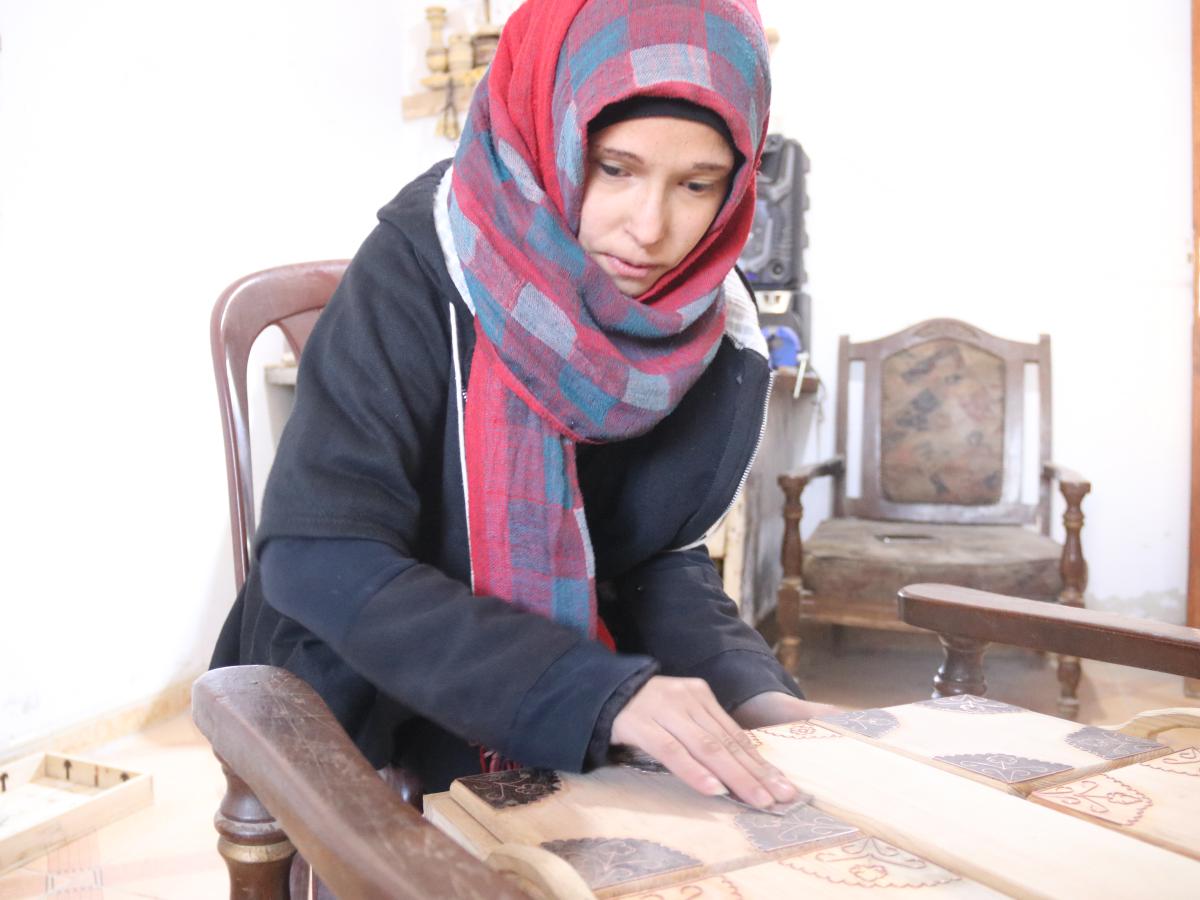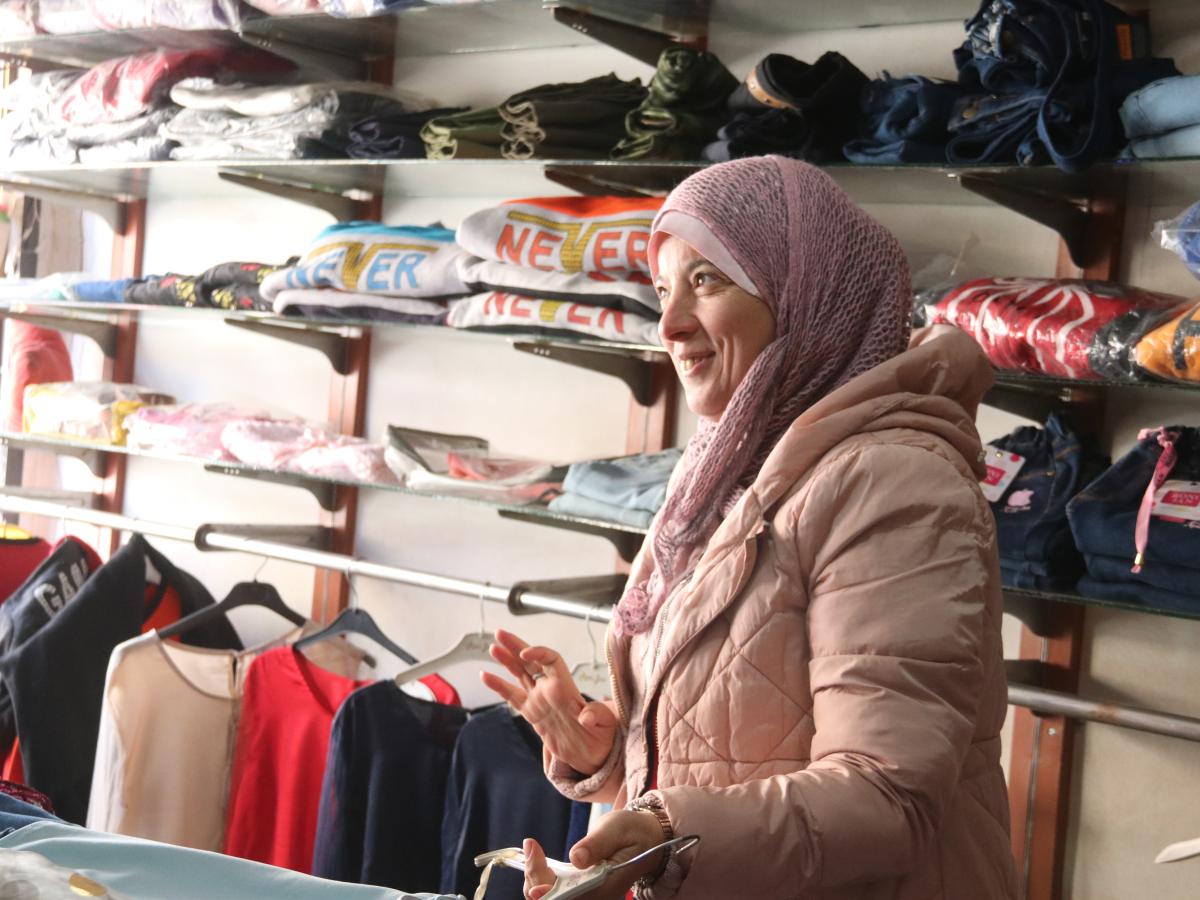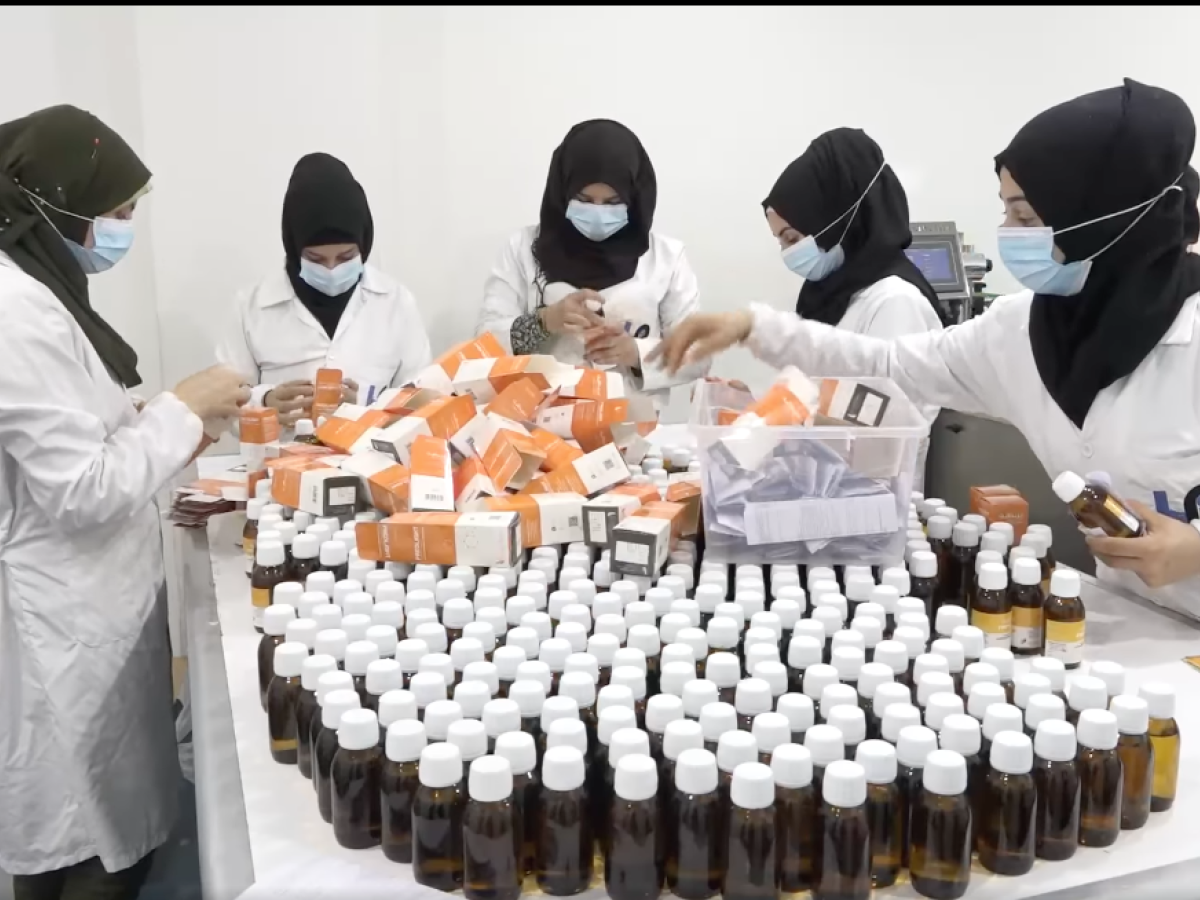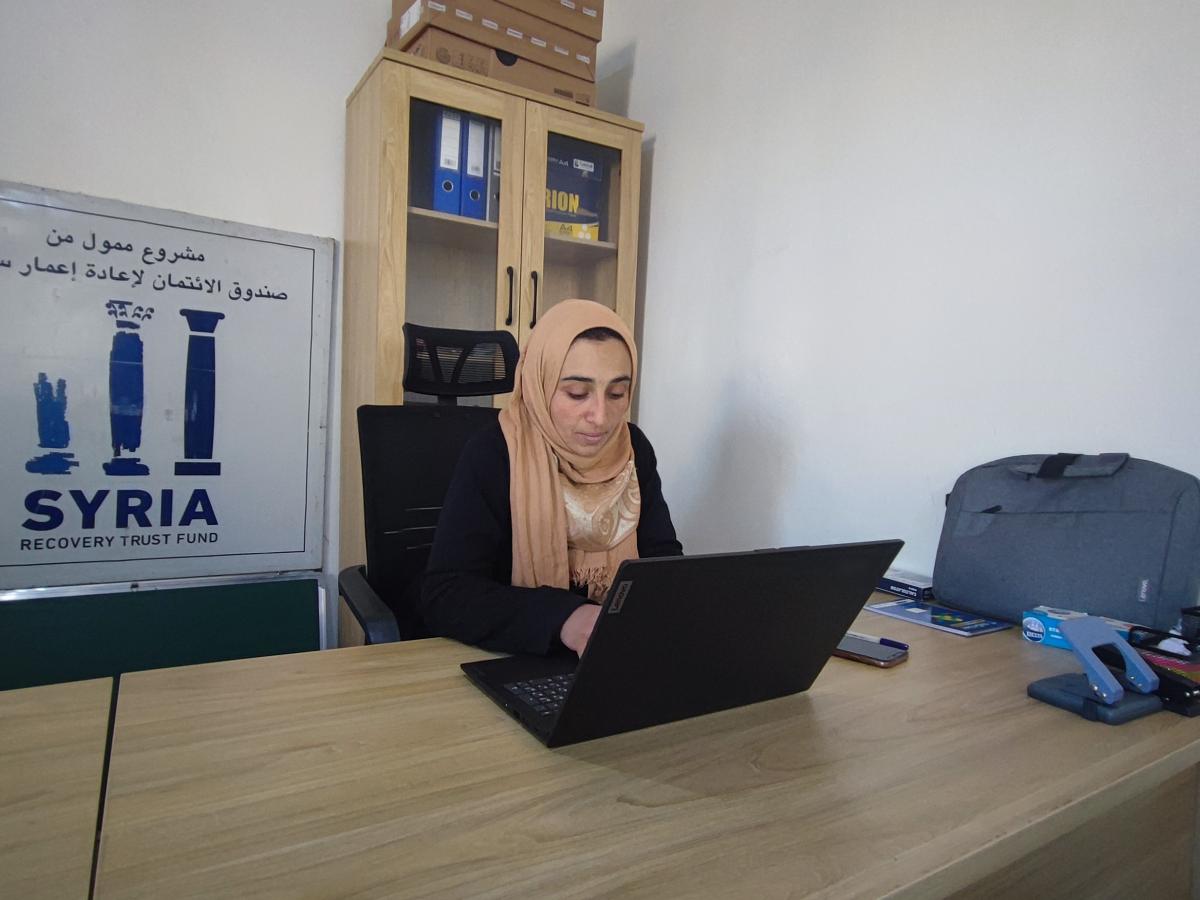Syrian Women of Courage
Across Syria, USAID promotes women’s empowerment. In honor of Women’s History Month, USAID is spotlighting Syrian women who have shown remarkable strength and courage, striving for a better life, and an inclusive community.

White Helmets Women Volunteers
USAID honors the bravery and courage of the Syria Civil Defence ("White Helmets") women volunteers.
In the aftermath of the catastrophic earthquake that struck northwest Syria, the White Helmets women volunteers (typically staffing medical centers) stepped up to help pull survivors from the rubble and provide critical on-site medical treatment to those injured.
“We lived through difficult moments during the rescue operations for those trapped under the rubble. The victims’ pictures will remain in our hearts forever.” volunteer Eman reflects on the critical hours and days after the earthquake in Syria.
In honor of volunteers Sobhiya, Maryam, and Fatima, who lost their lives doing their humanitarian duty, and who left an impact in Syria through their dedicated work.
Women with Disabilities Breaking Barriers as Entrepreneurs
Aya, Seamstress
“I am single, I have a scoliosis [a spinal disability], and I am the breadwinner for my family as well as for the orphaned children of my brother, who died in the war. USAID supported me with a financial award to open a small sewing workshop near my house in my village. This support provided me with permanent professional stability and provides a convenient local service for women in my community. I have a lot of customers!” says Aya, 28 from rural Raqqa governorate.
USAID is proud to work with inspiring women like Aya, providing them with the tools for start-up or expansion of their entrepreneurial endeavors.


Nour, Artisan
“I learned the ‘arabesque’ (wood carving) handicraft tradition when I was younger,” says Nour,* 24 years old, originally from Aleppo and now a resident with her family in Tabqa City.
Like hundreds of other entrepreneurs with disabilities in Raqqa governorate, USAID supported Nour to develop a business plan to expand her profession and open her own workshop. She is now exporting her unique products to Europe.
“Now, with my earnings I help my husband with our family expenses as his right hand. Earning a halal livelihood is all that we seek.”
Farah, Small Business Owner
“My husband died during the bombing that took place in Raqqa Governorate during the conflict.
Thanks to God and with the support of USAID, I now run my own make-up and perfume business. My shop is in a residential neighborhood and is frequented by local women, whom I receive as customers. USAID’s support was like a warm embrace, for me and many people with disabilities. Their material and moral support has improved the financial, living and psychological conditions for my family and the families I live with," says 30 year-old Farah, from Raqqa City.
USAID is proud to work with inspiring female entrepreneurs like Farah.


Aisha, Small Business Owner
Aisha, 45 years old and originally from Homs, owns a clothing retail business in Tabqa City. Like hundreds of other women with disabilities in Raqqa governorate, USAID is helping Aisha to grow her small business.
“USAID has helped me develop a business plan for an expansion. I applied for financial support to grow my business, expand my shop and improve the position of my products on the local market – receiving the financial support will really improve my psychological and financial situation,” says Aisha.
USAID is proud to work with inspiring women like Aisha, providing them with the tools for start-up or expansion of their entrepreneurial endeavors.
Montaha, Pastry Chef
“In order to be the breadwinner for myself and my family, I must work and never stop," says Montaha, 38 years old and mother of three, in Raqqa City.
Montaha is one of hundreds of job seekers with disabilities in Raqqa governorate for whom USAID has found paid work placements.
“USAID found me employment in a bakery making pastries and sweets. When I am working, I appear to myself and to others as stronger and of more value to the community.”

Lead Farmers

Wadha, Farmer
Wadha (pictured left) is a widow and a mother of six children and lives in the countryside of Deir Ez Zor. Wadha suffers from a disability resulting from a mild stroke several years ago. Two of her six children have been disabled since birth. After her husband was killed in the war, Wadha assumed the role of head of household and works her former husband’s land. She relies on this land to provide for her family. In 2022, Wadha benefitted from the USAID wheat seed program.
Huria, Farmer
Huria is a 60-year old female farmer who benefited from the Syria Recovery Trust Fund’s (SRTF) wheat seed project. As a lead farmer, she’s advocating that the donor community continues to invest in women so that they have the tools to succeed. The U.S., through USAID, is a proud member and contributor to the SRTF–a multi-donor trust fund aimed at financing priority projects in Syria.
“Thank God for this support and for giving us wheat seeds, without which we would not have been able to plant or harvest our lands or make use of them through rent. As women, we are responsible for the family, the house and everything really. We need to provide women with the support they need.”
Halima, Farmer
Halima was already working in agriculture with her husband ever since they got married. When he passed away in 2015, she took over the role of lead farmer to support her seven children. Halima is challenging gender norms as a lead farmer and head of household. In 2022, Halima benefited from USAID’s wheat seed delivery and training. She is now looking forward to achieving a good harvest this year.
Fteim, Farmer
Fteim (pictured right), 50 years old, tells us that becoming the breadwinner for her family did not come easy for her after her husband passed away. But with the right support, women like her can thrive. Ahead of the planting season, Fteim received wheat seeds to plant on her land. Fteim is now seeing the seeds sprout hope for her and her family. She calls on organizations like the SRTF to continue to support and empower women.
“Depending on what they do for a living, the organizations need to support women and enable them, whether they can be shepherds caring for cattle, tailors or business owners, whatever they need.”
Fidha, Farmer
After the regime arrested her husband in August 2012 in August 2012, Fidha found herself alone with seven children to raise. Despite not having a formal knowledge of wheat production, she stepped up to cultivate her field and provide for her family. Women like Fidha are challenging gender norms and demonstrating that they, too, can contribute to food security in Syria. Fidha was one of the 4,267 farmers in Deir-ez-Zour to benefit from USAID’s 2022 wheat seed delivery and training.
Halima H., Farmer
After her husband went missing in 2015, and her son was arrested by the regime in 2019, Halima H. became the head of household for two families totaling 24 people. Halima demonstrates the strength of courage it takes to not only lead one–but two households as a lead farmer. In 2022, Halima benefitted from the USAID wheat seed program. The yield from this crop represents the majority of her household income.

Women Advocating for Women’s Empowerment in Syria

Aysha, Entrepreneur
When Aysha saw an opportunity to fill an unmet need in her community, she started selling house accessories, clothes and make-up. Aysha recently received a grant from the Syria Recovery Trust Fund (SRTF) to scale-up her entrepreneurial initiative. She knows she’s not alone, and calls for more support for women to fulfill their many roles inside and outside the house.
“Women share responsibilities just like men. They have become breadwinners taking care of their families. I have received a loan from the Syria Recovery Trust Fund to improve and expand my business. I sell house accessories, some clothes and make-up. I hope to expand my business which should reflect positively on myself and others.
And I am sure many women have similar businesses or work interests. Given the current situation, one income is not enough. Children, mothers and fathers all work now.”
The U.S., through USAID, is a proud member and contributor to the SRTF–a multi-donor trust fund aimed at financing priority projects in Syria.
Kawthar, Midwife
Kawthar is a midwife at a Syria Recovery Trust Fund-supported center. She tells us how empowering just one woman benefits her family, her patients, and her community.
I am a midwife at a center supported by the Syria Recovery Trust Fund. I have become financially independent through this job, resulting in improved living conditions for myself and my children. I have also been empowered within my community, given my independence and the expertise I developed through training sessions.
As for the women [patients] we have provided them with natural delivery services, birth control and pregnancy monitoring services, thereby, reducing expenses on them.


Syrian Women Behind Small Business Success
USAID helps small businesses increase their competitiveness. In turn, new jobs generated are often filled by female employees—in fact, roughly one third of new jobs generated by USAID’s Economic Management for Stabilization (EMS) support are filled by female employees.
Sector | Total FTEs | Women | % |
|---|---|---|---|
Agro-Processing | 170 | 16 | 9% |
Construction Material Manufacturing | 176 | 28 | 16% |
Food Processing | 182 | 73 | 40% |
Health care | 85 | 48 | 56% |
Hospitality | 35 | 2 | 6% |
ICT | 20 | 1 | 5% |
Light Manufacturing | 708 | 295 | 42% |
Livestock & Agro-Processing | 42 | 9 | 21% |
Trading/ Distribution | 10 | 0 | 0% |
Grand Total | 1,429 | 472 | 33% |
One example: USAID helped a pharmaceutical company add 45 new jobs to northeast Syria’s workforce, 60% of which are women hires. This small company's female workforce is ensuring that there is availability of high-quality medications in Syria.
Kafaa, Administrative Assistant
With the help of the SRTF, Kafaa received administrative work training to become an executive assistant in a farming cooperative. With the right tools, women like her can succeed in their communities and give back.
“The [SRTF] provided us with training sessions and taught us how to use computers, how to manage our time, among other things. Now we are hopeful that we can prepare ourselves for the future and can go out to work or teach.
Women in rural areas are strong but need someone to help and encourage them. We hope that organizations such as the SRTF continue helping women and specifically women in rural areas."


